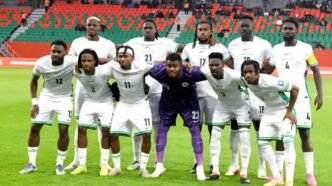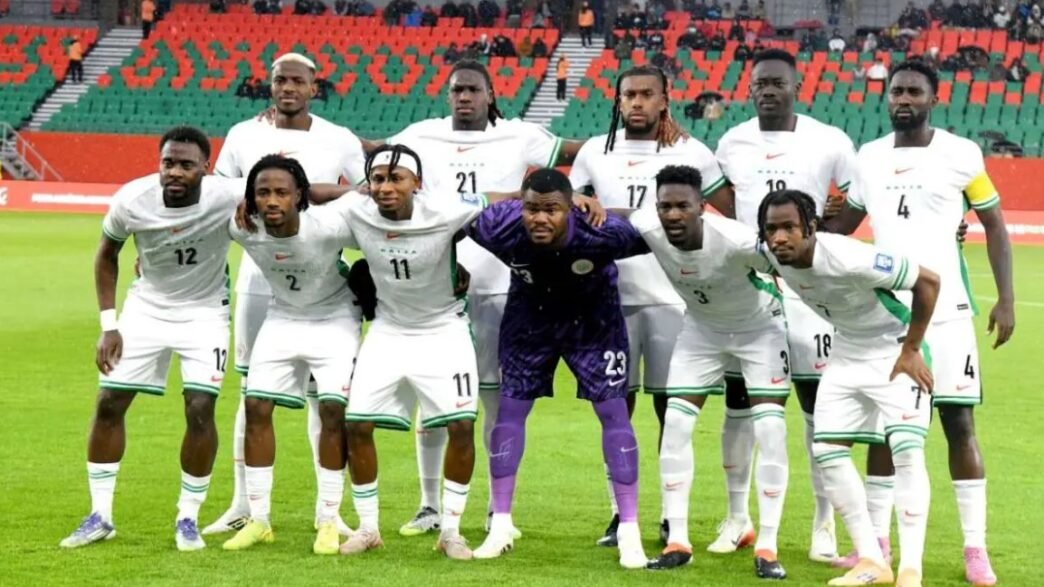In a weekend of big movement in international football standings, Nigeria’s Super Eagles enjoyed a notable rise in the latest FIFA Men’s World Rankings, while Spain maintained its place at number one globally. Though Nigeria’s climb comes amid the disappointment of missing out on the 2026 FIFA World Cup, the upward movement in the rankings provides a boost of optimism and some positive narrative to build on. For Spain, holding the top spot once again underscores their consistent excellence and stabilises their status among world football’s elite.
Nigeria’s Rise: A Silver Lining After World Cup Setback
The Super Eagles have moved three places up in the global rankings, jumping from 41st to 38th in the most recent list released by FIFA. (Vanguard News) This improvement comes despite Nigeria’s elimination from the African qualifying play-off for the 2026 World Cup, where they lost to the Democratic Republic of Congo on penalties. (TheCable)
While the defeat stung for the team and its supporters, the methodology behind FIFA’s ranking system means that qualifying matches and international results contribute to point totals even when a team falls short of its ultimate goal. In Nigeria’s case, their 4-1 victory over Gabon in the African play-offs provided a significant boost in points, which helped propel their upward movement. (Asaba Metro News)
On the continent of Africa, the Super Eagles are now ranked among the top five teams. They trail only Morocco national football team (11th globally), Senegal national football team (19th), Egypt national football team (34th) and Algeria national football team (35th). (Vanguard News)
What The Rise Means for Nigeria
While jumping three places may seem modest, it carries meaning for several reasons:
- Momentum: The upward re-ranking helps generate positive momentum for the national team. In the wake of failing to secure World Cup qualification, having tangible evidence of improvement in the rankings can bolster morale and confidence within the squad, among fans, and across the footballing community in Nigeria.
- Perception: Rankings matter for public perception. Being ranked 38th in the world places Nigeria in a more favorable company in terms of global footballing status. It suggests that, even though they failed to qualify, they remain competitive internationally.
- Seeding and future draws: Although the major draw for Nigeria has passed with the 2026 World Cup, improved rankings can influence future seedings in continental tournaments, qualification groups and friendly match opportunities. A higher ranking can mean a slightly easier draw or more respect from opponents.
- Validation of results: The rise highlights that the Nigeria team’s performance in certain matches — in particular the win over Gabon — was sufficiently strong to translate into higher ranking points. It shows that efforts in training, squad building and match execution are yielding measurable progress.
But Caution Remains
Despite the rise, the backdrop remains one of frustration. Nigeria’s failure to secure a place in the global showpiece for 2026 means that the next cycle must be approached with urgency and clarity. Being 38th in the world is respectable, but the gap between Nigeria and the very top teams remains significant. The next steps will be critical in converting ranking improvement into sustainable success.
Coaching staff, administrators and players will need to reflect on both the positives and the negatives: the win against Gabon demonstrated potential, but the penalty shoot-out loss to DR Congo exposed vulnerabilities. With the ranking boost comes expectation — and a challenge.
Spain Top of the Pile: Global Elite Confirmed
For the Spain national football team, the latest FIFA rankings reaffirm their standing as the world’s best. Spain remains at number one following the ranking update. (Reuters) They are followed closely by Argentina, France and England in the top-four positions. Brazil made gains to move into fifth place, overtaking Portugal and other competitors. (FIFA)
Spain’s hold on the top spot is a testament to their sustained performance across competitive fixtures, international tournaments and qualifiers. It reflects not just occasional success but a consistent standard of excellence at global level.
Why Spain’s Position Matters
- Benchmarking success: Holding the number one ranking provides Spain with both prestige and a benchmark for other nations aiming to catch up. Teams around the world view Spain as a model for footballing structure, youth development and match consistency.
- Psychological edge: Being ranked first can confer a psychological edge in matches — both for Spain (confidence) and for their opponents (intimidation). In tight fixtures, marginal gains count and the aura of being world number one may provide slight but meaningful advantages.
- Global profile and commercial value: High rankings reinforce a national team’s brand. For Spain, it enhances global visibility, commercial appeal, international friendly match opportunities and attractiveness for players, coaches and partnerships.
- Reflection of depth and consistency: Spain’s high ranking is not based on one tournament alone but on a series of strong performances. It suggests that the team is not only capable of winning but maintaining a high standard over time.
Contextualising the Rankings Update
The ranking update is based on 149 national-team matches conducted globally during the relevant international window. These matches include qualifiers, friendlies and international tournaments. (Inside FIFA) For Nigeria, despite their World Cup exit, the strategic timing of the win over Gabon and the draw with DR Congo (albeit followed by losses) meant that their results translated into improved ranking points.
Likewise, Spain’s results across Europe and globally, including their performances in competitive fixtures, allowed them to retain their number-one status. The fact that the top four remained unchanged indicates stability at the highest level. For emerging nations and strong mid-tier countries such as Nigeria, climbing into the top 40 is a sign of upward mobility but also a reminder of how far the top-tier teams remain ahead.
Looking Ahead: Challenges and Opportunities for Nigeria and Spain
For Nigeria:
- Next qualification cycle: The focus must shift immediately to upcoming qualification campaigns for continental tournaments and future global showpieces. Ranking improvement is encouraging, but securing tournament success is essential.
- Squad development: Young players must be integrated, and the tactical and technical weaknesses that surfaced in the play-offs must be addressed. Nigeria must ensure that its improved ranking is not a one-off but part of a lasting upward trajectory.
- Match scheduling and performance: To further improve ranking, Nigeria must schedule competitive fixtures and achieve wins against higher-ranked opponents. Each such victory can significantly boost points and improve seeding.
For Spain:
- Maintaining the lead: Standing still is not an option when you are world number one. Spain will need to continue delivering results, particularly in major tournaments and qualifiers, to fend off challengers.
- Managing expectations: With elite status comes pressure. Spain’s players and coaching staff must manage expectations, maintain hunger for improvement and avoid complacency.
- Evolution and adaptability: Opponents continually seek to close the gap. Spain must innovate tactically, renew its squad, and uphold its playing philosophy to remain at the top.
Conclusion
The latest FIFA Men’s World Rankings have delivered both encouragement and perspective. For the Super Eagles of Nigeria, climbing into 38th position is a meaningful step — a sign that despite the disappointment of missing the World Cup, the team remains on a positive path and can build toward greater success. For Spain, retaining the number one ranking confirms their status at the very apex of world football and renews their mandate to stay there.
Football fans, administrators and analysts will now turn their attention to how each nation builds from this moment. Will Nigeria convert the ranking boost into tournament qualification and performance? Will Spain deepen its dominance or face renewed challenges from contenders? The coming months and years will provide the answers.
For now, Nigeria can take pride in the climb. Spain can take comfort in the summit. And the rest of the football world will continue chasing.














